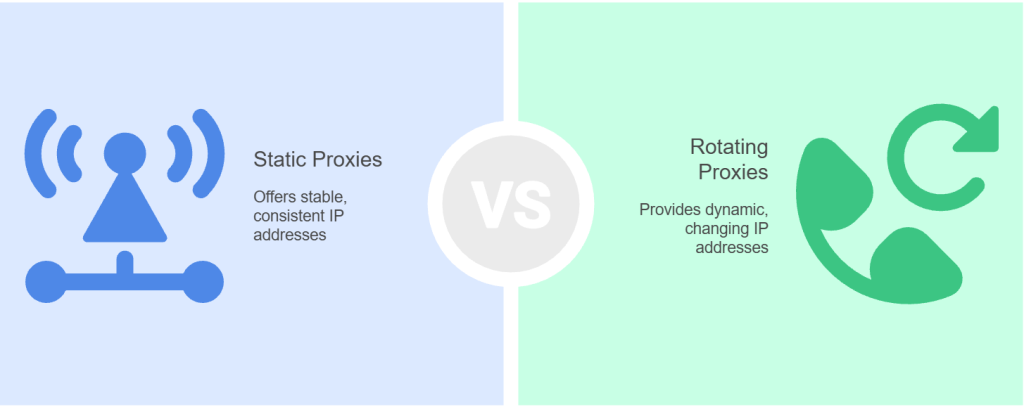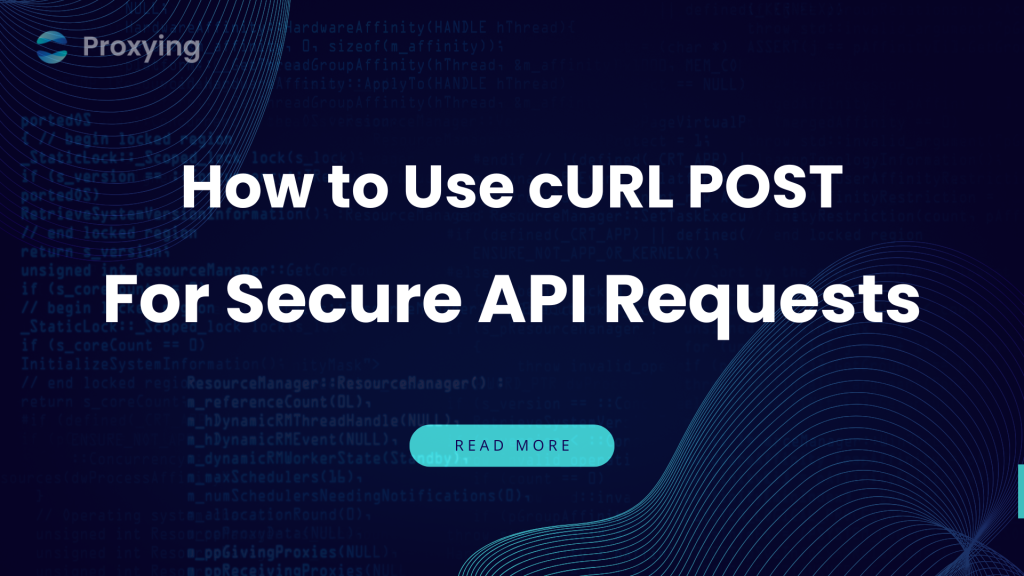There are a lot of proxy types out there. It can get confusing real quick. But one type that people always ask about is the residential proxy.
Why is it so expensive? What does it even do? Is it safe to use?
We’ll answer all of that in this blog. You’ll learn what a residential proxy is, what it’s used for, and how to choose the right one.
Let’s start with the basics so the rest is easy to follow.
What is a Residential Proxy?
A residential proxy is an IP address that comes from a real device. This could be our everyday gadgets like phones, tablets, PCs, etc. It’s not “fake” or generated in a data center. It belongs to someone’s actual internet connection.
Websites see you as a regular user when you use a residential proxy. Not a bot. Not a script. Just a normal person browsing from home. This makes it much harder to get blocked, flagged, or restricted.
That’s why residential proxies are so popular for tasks like scraping, automation, and accessing geo-blocked content.
They look real, because they are.
What is a Residential IP?
A residential IP is an Internet address assigned by an Internet Service Provider (ISP) to a real person’s home device. Think of your home Wi-Fi – that’s a residential IP.
It’s tied to a real location, a real device, and a real user. That’s what makes it so trustworthy in the eyes of websites.
When you use a residential proxy, you’re basically borrowing one of these IPs. So instead of websites seeing a random server or datacenter, they see what looks like a normal user browsing from home.
That’s the trick. And that’s why it works so well.
Types of Residential Proxies
Residential proxies usually fall into two main categories: Static and Rotating. Both come with real residential IPs, but their behavior is very different. Let’s break it down.

1. Static Residential Proxies
Static proxies give you fixed IP addresses. Once assigned, you keep the same IP throughout your session. These proxies can either be shared (used by multiple people) or dedicated (only you use them).
Some providers let you rotate these IPs manually or after a set time, but you’re not getting unlimited IPs. What you see is what you get.
2. Rotating Residential Proxies
Rotating proxies automatically assign you a new IP with every request or at regular intervals. These are shared by design and pulled from large IP pools, often in the millions.
You don’t manage individual IPs. Instead, the system rotates them for you.
| Static | Rotating | |
| Exclusivity | Shared/Private | Shared |
| Pricing | IP-based | Traffic-based |
| Performance | Fast | Fastest |
| Blocks | Uncommon | Rare |
| Security | High | High |
What are Dedicated Residential Proxies
A dedicated residential proxy is a residential IP that’s used by only one person – you.
You don’t share the IP with anyone else, which means better performance, fewer blocks, and more stability. These proxies are great if you’re running long sessions, logging into sensitive accounts, or managing multiple profiles. Since you’re the only one using the IP, you’re less likely to trigger red flags on websites.
But this exclusivity comes at a (quite high) price – often double what you would pay for a simple residential proxy plan.
Residential vs. Datacenter Proxies
Residential proxies let you browse the web as a legitimate, real user. These come from devices connected to actual home networks.
On the other hand, Datacenter proxies are ‘artificial.’ They come from servers in data centers, and while this makes them easier to source and maintain, they’re much easier to detect.
| Feature | Residential Proxies | Datacenter Proxies |
| IP Source | Real devices (home wifi, mobile phones) | Virtual machines in data centers |
| IP Ownership | Assigned by ISPs to actual users | Owned by hosting companies |
| Anonymity Level | Difficult to detect | Easily flagged as non-human |
| Speed | Moderate (depends on real user network) | Very high (stable data center bandwidth) |
| Cost | Expensive | Cheap |
| Scalability | Limited (IP pool depends on provider size) | Highly scalable |
| Use Cases | Web scraping, ad verification, account management, etc. | Price scraping, SEO tools, general automation, etc. |
| Risk of IP Ban | Low (if ethically sourced) | High (IPs often shared or blacklisted) |
Let’s Look at a Few Residential Proxy Use Cases
Here are a few examples of how businesses use residential proxies across industries:
1. Web Scraping
Modern websites are built to block bots. Businesses and individuals want ‘organic’ or real people visiting their websites, and they can block harmful bots in various ways.
Datacenter IPs get flagged fast because they don’t resemble normal user behavior. Residential proxies simulate organic user behavior, allowing users to scrape:
- E-commerce listings (product names, stock, pricing)
- Travel sites (ticket prices, seat availability)
- Real estate platforms (property data by region)
- News or media outlets (for aggregation or sentiment analysis)
They often bypass rate limits, CAPTCHA walls, and IP bans, especially when combined with browser fingerprinting tools. The number and severity of issues you run into heavily depend on the website you’re scraping

2. Ad Verification and Monitoring
Ad networks often show different ads depending on the viewer’s location or device. Testing these ads is a great use case for residential proxies.
- View ads exactly as a user in that region would
- Detect click fraud by confirming where clicks come from
- Monitor competitor ads in target markets
This helps agencies and brands verify ad delivery, placement, and visibility without being blocked or misled.
3. Market and Competitor Research
Residential proxies let companies gather competitive intelligence without revealing their identity. This includes:
- Monitoring competitor websites for price changes
- Tracking promotional offers or new product drops
- Running automated comparisons on large product catalogs
- Avoiding dynamic content based on user behavior or IP
Since traffic appears human, companies can conduct research without being blocked or serving biased data.
4. Geo-Testing/Regional Content Access
Proxies let you access geo-locked content and view websites from a ‘simulated’ location. By using a residential proxy, you can:
- Test how websites behave in specific countries or cities.
- Check region-specific pricing and availability.
- Access content, media, or tools locked to particular areas. (e.g., streaming platforms, coupon sites)
Some proxy providers even allow ZIP code or coordinate-level targeting for hyper-local testing.
5. E-Commerce Intelligence and Monitoring
Retailers and brands use residential proxies to:
- Monitor MAP (Minimum Advertised Price) violations.
- Track seller activity on platforms like Amazon, eBay, Walmart, etc.
- Detect counterfeit listings or fake reviews.
- Analyze customer behavior anonymously.
It enables real-time monitoring without risking blocks that could disrupt operations.

6. Anti-Phishing & Brand Protection
Residential proxies help security teams investigate phishing threats without exposing themselves.
- Accessing phishing or spoofed websites using real IPs to avoid detection.
- Monitoring fake ads, login pages, or impersonation scams across different regions.
- Collecting real-user evidence (screenshots, session data) for legal takedowns.
- Simulating genuine traffic to uncover hidden or geo-targeted malicious behavior.
Legality of Residential Proxies
Residential proxies are legal, but how you use them and where they come from is what really matters.
1. The Proxy Itself Is Not Illegal
Using a residential IP to route your traffic isn’t illegal on its own. We’ve covered many legitimate use cases above.
2. Proxy Usage Determines Legality
If you’re violating a website’s Terms of Service (ToS), you risk getting your IP blacklisted or even legal consequences. Some illegal use cases include sending, scraping sensitive data, and violating ToS.
3. Ethically Sourced vs. Unethically Sourced Proxies
This is an important factor in choosing a proxy provider.
Ethically sourced proxies come from users who opt in to share their IPs, usually in exchange for money or app benefits. Proxy providers like Proxying only provide ethically sourced proxies.
Unethically sourced proxies are not only unethical, but they are also often hijacked from:
- Malware-infected devices
- Public Wi-Fi networks
- Compromised IoT devices
The proxy industry lacks clear standards when it comes to sourcing residential IPs. At Proxying, we believe that transparency and ethical sourcing aren’t optional. They’re essential. That’s why we only work with verified, opt-in proxy pools and take responsibility for bringing more structure and trust to an industry that’s often clouded by shady practices.




